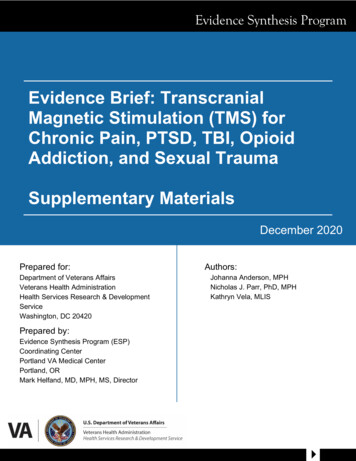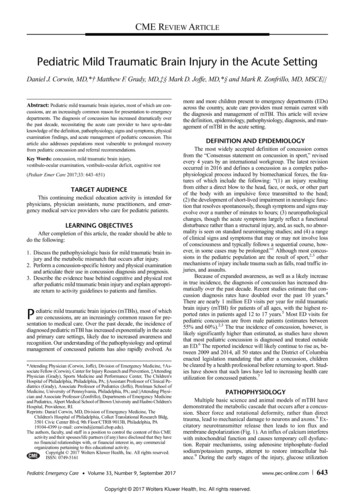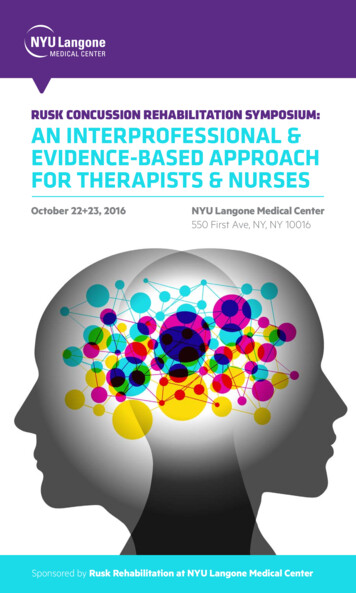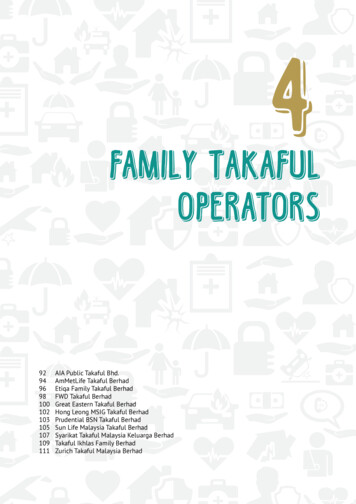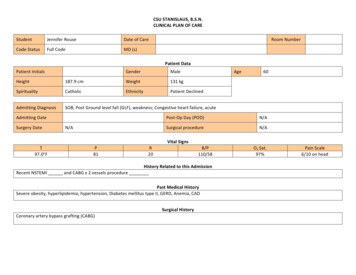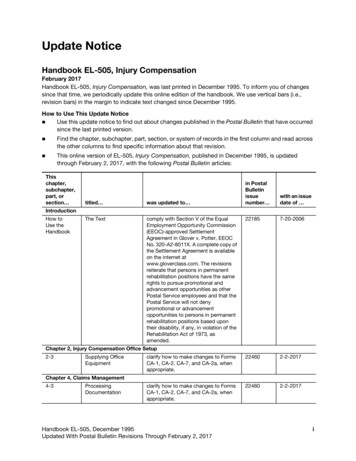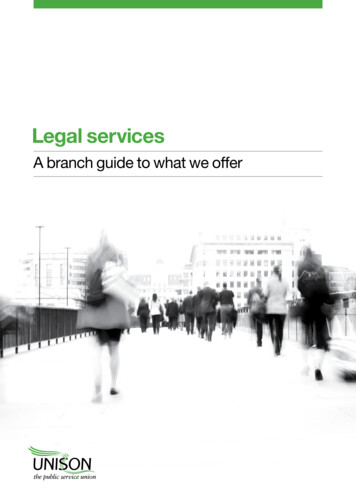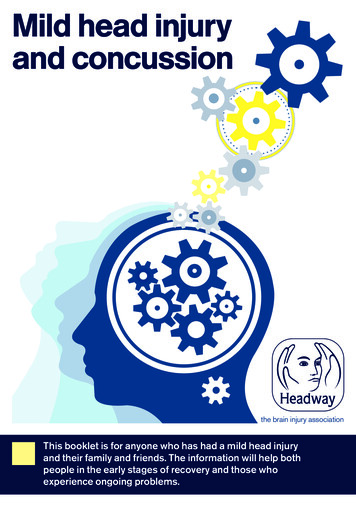
Transcription
Mild head injuryand concussionthe brain injury associationThis booklet is for anyone who has had a mild head injuryand their family and friends. The information will help bothpeople in the early stages of recovery and those whoexperience ongoing problems.
n Mild head injury and concussionpublished byHeadway – the brain injury associationBradbury House, 190 Bagnall RoadOld Basford, Nottingham NG6 8SFAuthor: Richard Morris, formerly of Headway – the brain injuryassociationEdited by: Dr Kevin Foy – Consultant Neuropsychiatrist atThe Walton Centre, Liverpool and Tamsin Keyes –Publications and Research Manager, Headway – the braininjury associationAll rights reserved. No part of this publication may be reproduced,stored in a retrieval system, or transmitted by any means,electronic, mechanical, photocopying, recording or otherwise,without prior permission in writing from the copyright owner. Headway – the brain injury association, 20094th edition 2020ISBN: 978-1-873889-90-9Printed in the UK by Phase PrintThis booklet is kindly sponsored bycycle-sos.co.uk
Headway – the brain injury association nContentsIntroduction.2Section one: What is a mild head injury?.4Initial assessment.4Early stages after discharge .5Dos and don’ts in the first few days after injury.6Section two: Post-concussion syndrome.8Common symptoms and practical suggestions .9Cognitive (thinking) symptoms.10Physical symptoms.12Emotional and behavioural symptoms.23Section three: Other issues.28Further information and support.32Conclusion .33Further reading .34Useful organisations .36Glossary .38How to donate .40Acknowledgements.40About Headway .41This booklet received a CommendedAward at the British Medical AssociationPatient Information Awards 2010.1n
n Mild head injury and concussionIntroductionead injuries come in a variety of guises. Some are severe,with loss of consciousness lasting days or weeks andcan cause significant neurological disabilities afterwards.Fortunately, most are classified as mild. However, even socalled ‘mild’ head injuries are associated with physical,cognitive and emotional symptoms.HThis booklet is written for anyone who has had what isclassified as a mild head injury and for their family and friends.While the majority of people recover from a milder head injuryvery quickly, experiencing one can still cause feelings of worryand concern. However, understanding the symptoms,knowing what to look out for and learning how to cope withthe effects can help at a time that, for some, can be scaryand confusing.Mild head injury is also often referred to as concussion, minorhead injury or mild traumatic brain injury (mTBI). Regardless ofthe terminology used, the occurrence of a head injury in thesecases causes the brain to shake back and forth inside theskull, causing mild damage. While most mild head injuriesresult in no long-term damage to the brain, it can causetemporary disruption to brain function that can last for at leasta number of weeks.We hope the information in this booklet proves useful, both forpeople in the early stages of recovery from a mild head injuryand for those who experience ongoing problems.The booklet is divided into three sections for ease ofreference. Section one gives information about the definition ofn2
Headway – the brain injury association nmild head injury, initial assessment, signs of possible earlycomplications and some dos and don’ts to aid the early stagesof recovery.Section two discusses post-concussion syndrome, which isthe name given to the set of symptoms that can causeongoing problems after mild head injury. This section providesinformation on some of the most common symptoms andsome practical suggestions to compensate for problems andaid recovery.Section three provides information on other practical issueswhich may be of concern and signposts to further sources ofinformation and support.Mild head injuries affect people in different ways and not allthe information in this booklet may be relevant to yoursituation. The booklet is designed so that you can easily referto the sections that apply to you, so don’t feel that you need toread the whole booklet if you don’t wish to.3n
n Mild head injury and concussionSection one:What is a mild head injury?t is estimated that over a million people each year attendaccident and emergency departments in the UK after a headinjury, with the majority of these injuries being classed as mild.Mild head injury is commonly caused by falls, road crashes,assaults and sports accidents (information about mild headinjuries sustained specifically through sporting accidents isavailable in the Headway factsheet Concussion in sport).IMild head injuries can also be sustained during relativelycommon accidents such as hitting one’s head against a wall oran object dropping onto the head.There are currently a number of different ways of classifyingmild head injury, but at present it is most widely defined by:l Loss of consciousness of less than 30 minutes (or no lossof consciousness).l Post-traumatic amnesia (PTA) of less than 24 hours afterinjury. This is a period where people are confused, actstrangely and are unable to remember what has justhappened. More information on PTA is available in theHeadway factsheet Post-traumatic amnesia.It is important to note that only around 10% of reported mildhead injuries involve a loss of consciousness – so it isimportant to not solely rely on this as an indicator.Initial assessmentPatients who are suspected of having a head injury should beassessed using the Glasgow Coma Scale (GCS), whichn4
Headway – the brain injury association nassesses their level of consciousness on the basis ofneurological signs and responsiveness. The scale ranges from3–15 with 3 being seen in death or deep coma and 15associated with being fully conscious and not confused. For amild head injury, the initial score will have been 13–15 andpatients shouldn’t be discharged until their GCS is 15.If patients are considered to be in danger of complications, theywill be given a CT scan when they are initially seen in hospital.CT stands for computerised tomography. A series of X-rays aretaken to build up a detailed picture of the inside of the skull andbrain. CT scans of the head are an effective method ofchecking for a possible brain haemorrhage (bleeding in oraround the brain) or swelling of the brain. In some cases it maybe necessary to perform an MRI scan or other investigationsafter the CT scan in order to get more detailed information.For more information about scans commonly used to detectbrain injury, see the Headway factsheet Scans and tests afterbrain injury.Early stages after dischargeIn the early days of a mild head injury, it is common to feelsymptoms such as dizziness, tiredness, headaches andproblems with your memory, among other symptoms. Thesection of this booklet ‘Common symptoms and practicalsuggestions’ discusses these in more detail.Although it is unlikely, serious complications can sometimesarise in the days and even weeks after a mild head injury. It isimportant that you, and a responsible adult who can monitoryour condition, are aware of the symptoms listed below whichcould indicate a more serious injury:5n
n Mild head injury and concussionlllllllllllLoss of consciousnessNew deafness in one or both earsLoss of balance or problems walkingAny weakness in one or both arms or legsAny vomitingClear fluid coming out of your ears or noseDrowsiness when you would normally be wide awakeIncreasing disorientationProblems understanding or speakingBlurred or double visionSevere headache not relieved by painkillers such asparacetamoll Bleeding from one or both earsl Any fits (collapsing or passing out suddenly)l Inability to be wokenIf you experience any of these symptoms it is importantthat you go to an emergency department immediately.To access an easily printable version of the above list, see theHeadway factsheet Mild head injury discharge advice.Dos and don’ts in the first few daysafter injuryl Do make sure you stay within reach of a telephone andmedical helpl Do have plenty of rest and avoid stressful situationsl Do try to keep a regular sleep routine so that you are goingto bed and waking up at the same time each dayl Do show this booklet to a friend or family member who canmonitor your conditionl Do take painkillers such as paracetamol for headachesn6
Headway – the brain injury association nl Don’t stay at home alone for 48 hours after leaving hospitall Don’t drink alcohol or take recreational drugsl Don’t take aspirin or sleeping tablets without consulting yourdoctorl Don’t return to work until you feel ready and discuss yourcondition with your manager or occupational health teaml Don’t play or train for any contact sport for at least threeweeks without consulting your doctor and check the sport’sreturn to play protocol for concussionl Don’t drive until you feel you have recovered; if in doubt,consult your doctor7n
n Mild head injury and concussionSection two:Post-concussion syndromewide variety of physical, cognitive and emotional symptomscan be seen after a mild head injury. The symptoms after ahead injury can be very distressing, especially if you don’t knowwhat to expect. In most cases these symptoms resolvethemselves within a few days or weeks, though in some theymay persist for a much longer period of time. Post-concussionsyndrome, also known as post-concussive syndrome, is thename given to the constellation of symptoms which continue tooccur following a mild head injury.AThese continuing symptoms are likely to resolve themselveswithin a few days or weeks. However, in a minority of cases,problems may persist for longer, but still resolve themselveseventually. This can be a frustrating and distressing time, asthe symptoms may be subtle, and you may not feel that youare back to a sense of full health.This may also be the most prolonged period of feeling ill thatyou have experienced and you may wonder if you will ever feelbetter. Following the suggestions in this section should help tomake you feel better as quickly as possible. The mostimportant thing to remember is to be patient and kind toyourself and try not to rush things.If you have these symptoms for more than about two weeksafter the injury, or if they are severe, worsening and not gettingany better, then you should see your GP.Information for GPs on mild head injury is available in theHeadway factsheet Mild brain injury: a guide for GPs.n8
Headway – the brain injury association nThis factsheet can assist your GP with diagnosing postconcussion syndrome and providing referrals to specialist carewhere appropriate. Your GP might be able to refer you to aneurologist, neuropsychologist or neuropsychiatrist forfurther support.You can also find a directory of chartered neuropsychologistsin private practice on the British Psychological Society websiteat www.bps.org.uk (see ‘Useful organisations’).Common symptoms andpractical suggestionsThe symptoms outlined in this section are separated into thefollowing categories:l Cognitive (thinking) symptomsl Physical symptomsl Emotional and behavioural symptomsYou might experience any number of these symptoms atdifferent times and the effects of a mild head injury are differentfor everyone. This section offers information on the mostcommon symptoms and practical suggestions to help yourecover more quickly. It may be possible to treat each of thesymptoms in isolation, so it is important to consult your GPabout possible referral to a relevant specialist.This section contains references to other Headway publicationswhich may be of help. Headway publications are available todownload free of charge from www.headway.org.uk/information-library or by contacting the Headway helpline on0808 800 2244 or helpline@headway.org.uk.9n
n Mild head injury and concussionCognitive (thinking) symptomsCognitive symptoms are very commonly experienced after amild head injury. These symptoms can take the form ofproblems with memory, concentration and organisation. Theycan also be quite subtle. Stress and fatigue can worsencognitive symptoms, so it is very important to practice self-care.Memory problemsLoss of memory can make everyday life frustrating. You may beable to remember your wedding day, but not where you putyour shoes. This can be because you’re having problemsconcentrating and also because mild head injury disrupts thememory system for a while. Your memory should improve asyou recover, but in the meantime there are ways that you canhelp yourself.l Use calendars and diaries to remind you of eventsl Use stick-on labels as reminders, for example, to make sureyou lock the back doorl Carry a notebook to write down new information and thingsyou need to rememberl Use cooking timers in the kitchenl Assign a specific place for everyday items and make sureyou keep them therel Use calendars and reminder apps on mobile phones.However, try to avoid overusing such electronic devices, asthese can be quite cognitively demanding and can affectyour quality of sleepl Break down information into small chunks to make it easierto rememberl Get plenty of sleep and rest; your memory will work better ifyou are fresh and restedn 10
Headway – the brain injury association nFor more information on this subject see the Headway bookletMemory problems after brain injury and the factsheet Copingwith memory problems: practical strategies.Difficulties with attention and concentrationThe ability to concentrate and attend to things is very oftensignificantly reduced by mild head injury, particularly in the firstfew days. The problem usually takes two forms.Firstly, it may be difficult to concentrate on more than one task,or to concentrate when there are distractions, such as whenchildren are playing or the TV is on. You may find it difficult tocope in large groups of people when several conversations aregoing on at once.Secondly, the concentration span can be reduced so you mayfind it difficult to concentrate on one thing for as long as usual.This can be particularly disruptive to work and study.Some suggestions for dealing with attention and concentrationproblems are as follows:l Start a task when you are feeling fresh, then stop as yourattention begins to fadel Cut out background noisel Try to carry out important or complex tasks in a quiet areal Do one task at a timel Break down tasks into manageable chunksl Concentration depends on being alert, so if you are tiredand can’t concentrate, have a restDifficulties with planning and organisingYou may find it difficult to plan and organise. This can befrustrating, especially if these skills are needed for your job, and11 n
n Mild head injury and concussioneven everyday tasks such as preparing meals can becomedifficult. Some suggestions to help compensate for thesedifficulties are:l Try to stick to a daily routinel If your job requires high levels of planning and organisation,consider returning on part-time hours and taking on lighterduties until you feel better. Remember not to rush intoreturning to full-time work too soon, as this can result in aloss of confidence and can lengthen the period of recoveryl Try to stick to simple meal plans – follow set recipes fromcookery books and, if possible, get someone to helpl Make ‘to do’ listsl Set realistic goals for each day and don’t be toodisheartened if you don’t always achieve theml Use external aids, such as mobile phones, pagers, electronicwatches or tablets, to provide reminders of tasksl Use a diary, journal or online calendar (e.g. Google Calendar)l Do one task at a timel Try to plan and carry out tasks in a quiet areal Get plenty of restl Accept that recovery is often a journey and don’t berateyourself if you make mistakesFor more information on this subject see the Headwayfactsheets Difficulties with decision making after brain injuryand Executive dysfunction after brain injury and the bookletRedeveloping skills after brain injury.Physical symptomsSleep problemsPeople tend to need more sleep than usual for a while after amild head injury. Getting enough sleep and maintaining goodn 12
Headway – the brain injury association nsleep habits are essential to a good recovery. Lack of sleepleads to fatigue, which can worsen a lot of the other problems,such as difficulty concentrating, headaches and irritability. Thefollowing dos and don’ts should help you to maintain goodsleep habits:l Do establish a regular routine by going to bed and gettingup at the same times each dayl Do take ‘power naps’ during the day but try to avoid doingso after 4pm, as this may disrupt your sleep/wake cyclel Do use an alarm clock to wake you from naps to ensure youdon’t sleep too longl Do use your bed for sleeping only – don’t watch TV in bedl Do develop rituals before bedtime to wind down and relax;for example, taking a bath or listening to gentle musicl Do get regular exposure to the outdoors and natural lightl Do exercise regularlyl Do create a calm bedroom that is cool, dark and quiet –earplugs and blackout blinds can help; remember that thelight from electronic devices such as phones and tablets canaffect sleep cycles, so switch these off if possiblel Do avoid stress and worry at bedtimel Do use relaxation techniques such as mindfulnessl Don’t push yourself to stay awake and don’t worry about‘giving in’ to tirednessl Don’t eat heavy meals late in the eveningl Don’t look at the time when you wake up as this may make itdifficult to get back to sleepl Don’t have too much caffeine, nicotine or alcohol in the eveningAs you recover you will find that you need less sleep. However,you may find that you can’t get to sleep, or wake during thenight. Typically, this can be made worse by:13 n
n Mild head injury and concussionl Stress – This may be caused by frustration with your rate ofrecovery, or by other people expecting you to recoversooner. Financial or family problems may also contribute,particularly if you are still absent from work.l Changes in your sleep cycle – If you don’t have regulartimes for getting up and going to bed then your sleep mightbe affected.l Depression – This can affect your sleep cycle by making itdifficult for you to get to sleep at night and making you wakeup early in the morning.At this stage there are a number of strategies that can help:l Relaxation training. Ask your GP about techniques such asmeditation and yoga. You could also ask about referral to acounsellor who can teach relaxation techniques.l If you have specific worries that are affecting your sleep try toresolve them. Talk the matter through with a close friend orfamily member, or ask your GP about referral to a counsellor.l If you have cut out your daytime nap and are feeling more tired,you could try taking naps again and then gradually phasingthem out. If you are still taking daytime naps and are havingtrouble getting to sleep at night, try cutting out the naps.FatigueThis is one of the most common effects of mild head injury andit is also the most important symptom to control, as being tiredaffects everything you do. You may get tired more quickly thanbefore and even simple actions, like dressing or cooking, canmake you feel exhausted.Following the suggestions in the previous section on sleepproblems should help you to manage your fatigue and there area number of other things you could try:n 14
Headway – the brain injury association nl Set a daily routine – prioritise and set realistic targets toachieve each dayl Pace your workload by taking lots of short breaks during tasksl Think about when you are most tired – try to do your moredifficult and demanding tasks at times when you are mostawakel Identify the triggers to your fatigue – if you can recognisethe activities and situations that are most tiring you can planfor them in your daily routinel Build rest times into your dayl Don’t overdo it, but try to build activities up slowly over timel Explain to other people that you get tired – it can be difficultto recognise the signs of fatigue after a head injury, so askfamily and friends to let you know when you appear fatiguedand the signs they noticel If going back to work, start with fewer hours and build upgraduallyDon’t push yourself or you may get into a cycle where you don’tget enough rest. In the space of a few days you could becomecompletely exhausted and all other symptoms may get worse.This is referred to as ‘boom and bust’ and you should take careto avoid it. Your fatigue will decrease as you start to feel betterbut can return, along with other symptoms, if you try to do toomuch too soon. For further information on fatigue and sleep youmay find it useful to refer to the Headway booklet Managingfatigue after brain injury.HeadachesHeadaches are a common complaint after mild head injury,particularly in the early stages. Remember, if the headache issevere, persistent and unrelieved by ordinary painkillers in thefew days after injury then it can be a sign of complications andyou should return to the emergency department.15 n
n Mild head injury and concussionn Case study“I slipped on ice and banged my head. I have never beenthe type of person to go to hospital, so I went home andslept. I went back to work the next day and found it hard toconcentrate. I was tired and found myself getting reallyirritated with everyone and by the end of the day I had awhopping headache.“My GP explained that I had concussion and told me torest. I took a few days off but when I got back I found Icouldn’t bear the noisy atmosphere at work. I agreed withmy boss that I would work part time and now, after threemonths, have gone back full time. I still feel tired but it’sgetting better all the time.”David – SouthamptonIn the later stages, headaches are often caused by otherdifficulties. For example, if you are fatigued, stressed, physicallytense, or struggling with your concentration, you may getheadaches. At this stage the following suggestions may help:l Write down when you get headaches – you may be able to seeif there is a time or place that causes them and plan for thatl Try relaxation techniques – often headaches are due tomuscle tension and techniques such as meditation and evenmoderate exercise could helpl Try not to take too many painkillers (especially onescontaining codeine) as these can become addictive and canactually make headaches worse in the long runl You should discuss these issues with your GP or otherhealthcare professionaln 16
Headway – the brain injury association nDizziness, balance and co-ordination problemsMild head injury often disrupts the balance organs in the ears,so it is common in the first few days after injury to experiencevertigo, where the world seems to spin around you. The slowingof information processing caused by the injury can also lead to afeeling of unreality, disorientation and a sense of ‘floating’.Symptoms which are closely related to dizziness are problemswith balance and co-ordination. You may feel wobbly andunsteady on your feet because of the dizziness. You may alsodrop things or bump into people and objects due to your brainprocessing information less efficiently than usual.You can be assured that these problems are common andusually settle within a few days or weeks and then disappearentirely. Take greater care in situations which could bedangerous, such as crossing the road, and don’t drive until thesymptoms have gone. If the symptoms are very problematic orpersistent then see your GP as there are some therapeutictechniques which may help.For more information on this, see the Headway factsheetBalance problems and dizziness after brain injury – tips andcoping strategies.Visual problemsIt is important to remember that if you experience blurred ordouble vision in the first few days after the injury you shouldreturn to the emergency department. If you still experiencedouble vision in the longer term then legally you must not driveand should consult your GP about this (for further guidance onthis issue, see the Headway booklet Driving after brain injury).Some other problems with vision that are common after mildhead injury are:17 n
n Mild head injury and concussionl Loss of depth perceptionl Photophobia (sensitivity to light)These symptoms are usually mild and should clear up within aweek or two. However, if they persist or are very debilitatingthen see your GP.Be extra careful in situations where clear, accurate vision isrequired and avoid driving until the symptoms have cleared. Ifyour depth perception is affected, be very careful whencrossing the road.Sensitivity to light is one of the most common visual problemsafter mild head injury. This can even be triggered by indoorlighting, especially fluorescent lights and it can help to wearsunglasses or tinted glasses, even indoors. This problem canremain when other symptoms have cleared, meaningsometimes people have to carry on wearing dark glasses, evenwhen they have otherwise recovered.For more information on this issue, see the Headway factsheetVisual problems after brain injury.Hearing problemsHearing problems usually take the following forms:l Mild deafnessl Sensitivity to loud noisel Tinnitus – the perception of sound without external cause.This can take the form of ringing, buzzing, humming,whistling, whining or other noisesAny deafness could be caused by damage to the inner ear ornerves in the brain and should be reported to a doctor to rulethese possibilities out. Alternatively, you may only notice then 18
Headway – the brain injury association nimpaired hearing when you are in an environment such as aparty, when many conversations are going on at once. In thiscase the impaired hearing may be caused by reduced attentionand concentration and should get better as informationprocessing ability gets back to normal.Sensitivity to loud noise is common after mild head injury. Aswith other symptoms this will go away in time, but until it doesthe only real strategy is to avoid noisy atmospheres that youfind distressing. Tell family and friends about the problem andask them to respect your need for a quiet environment.Avoiding noisy situations can lead to avoiding environmentsthat you would usually enjoy, such as parties and footballmatches. Talk to family and friends about this and try toorganise enjoyable, social occasions where you can control thenoise levels. For example, ask a select few friends around for aquiet dinner.Tinnitus is not one of the most common effects of mild headinjury, but can be extremely distressing when it occurs. See adoctor for an examination to rule out possible treatable causesand ask about referral to an ear specialist.Communication problemsYou may find it difficult to express yourself in an accurate way.You may not be able to find the right words, or you mightmuddle sentences. The following suggestions may help:l Be patient with yourselfl Take the time to find the right wordsl Prepare what you want to say by thinking of key words ormaking listsl Explain to people that they need to be patient with you19 n
n Mild head injury and concussionYou can also ask your GP to refer you to a Speech andLanguage Therapist who could be able to help. For furtherinformation on this subject see the Headway booklet Copingwith communication problems after brain injury.Changes to taste or smellFollowing a mild head injury some people report that theirsenses of taste and/or smell have been affected. The senses oftaste and smell are linked so if the sense of smell is lost thenthe sense of taste will also be affected.Changes to the senses of taste and smell can be extremelydistressing and sadly there are no cures available. Recoveryoften occurs spontaneously after mild head injury, often withinthe first three months. In the meantime, there are strategies youcan use to compensate and stay safe:l Fit a smoke alarm, have electrical appliances regularlyserviced, unplug appliances when not in use and use analarm to remind you of food cooking in the ovenl Have gas appliances regularly serviced and fit a gas detector;you might want to consider fitting an electric cooker and firel Always eat or throw out food by its ‘use by’ date; clear outthe fridge and cupboards regularlyl Try to keep products such as drinks, bleach, cleaningchemicals and solvents in their original bottles/packets;make sure they are clearly labelledl Empty rubbish bins regularly and keep toilets and kitchenappliances clean to avoid health risksl Be aware of the need to wash yourself, your clothes andbed-sheets regularly; use an antiperspirant deodorant andperhaps a shoe deodoriser tool Ask a close family member, loved one or friend to let youknow if your body odour is an issuen 20
Headway – the brain injury association nl It is important to keep your mouth clean, brush teethregularly and thorou
aid recovery. Section three provides information on other practical issues which may be of concern and signposts to further sources of information and support. Mild head injuries affect people in different ways and not all the information in this booklet may be relevant to your situation. The
